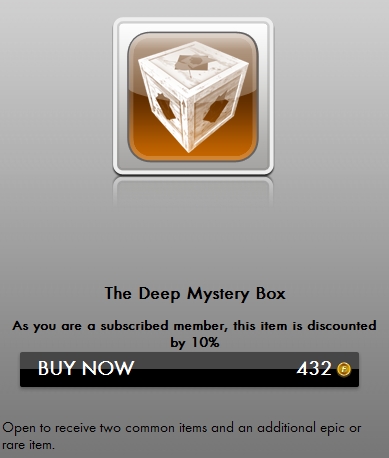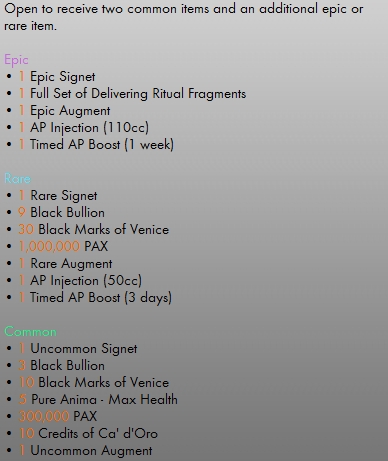
As is typical of these things, you're told what you can "win" but you're not told what your odds are. Here's what's on offer inside them:

So, you're guaranteed to receive two common items. They're all quite minor, being there as stocking-fillers so people think they've got more for their money. They're like 30-minute items, in that if you wanted to play to get them it would take you 30 minutes (except the pure anima, which you already have to pay real money to buy). The black marks of Venice are useless if you don't do PvP.
No-one will buy these for the common items, though (indeed, Funcom also introduced a Mystery Box you can buy if you want to try get those). What people who buy these Deep Mystery Boxes want are the epic items. The rare items are like a consolation prize for not having got the epic item you were hoping for. They also make it harder to win the epic items, in that if they weren't there then people would always get something epic. The problem is, of course, that players have no idea what their chances of winning anything are, and unless someone manages to obtain a large enough number of samples to come up with an analysis, they're not going to find out, either.
For example, players are guaranteed a rare or epic object. There are 7 items in the rare list. It could be that there are 8 items in the rare list, the last one being "roll on epic table". This is how Dungeons & Dragons does it. The players may look at the lists and think, "hmm, 7 rares and 5 epics, so I have a 5 in 12 chance of getting an epic", but actually they may have no such chance at all.
It's worse than that, of course. There's no reason why those rares have to be distributed evenly in the distribution table. There could be 50% chance of getting 1,000,000 PAX (PAX being the in-game currency), 44% chance of getting 30 Black Marks of Venice, and 1% chance each of getting the rest (including "roll on the epic table").
The epic table does have some juicy items on it. It also has some so-so ones. Epic signets take ages to grind for, so they'd be top of many players' list. The epic augment would be right up there, too. The ritual fragments aren't a big deal, though. The AP injection just gives you a chunk of experience points and the AP boost increases the rate you get them for a week. People who buy these boxes will be hoping for the signet or the augment if they're high-end, or the free AP items if they're on the way up.
It gets even worse, though. There are many signets and many augments. Even if you do win one, there's no guarantee it's one you're going to be able to use. A tanking signet isn't a lot of use to a healer, for example. Assuming you can sell it, OK, it's like a few million PAX, but you don't want a few million PAX: you want a signet you can use. The thing is, there's nothing to suggest that the way the signets are selected has to be evenly balanced. The distribution table for signets from these boxes could easily be weighted in favour of the ones few people want, which wouldn't sell for much at all. Signets that people really, really want may have a lousy chance of appearing. Come to that, they may have no chance of appearing whatsoever.
With my 10% subscription bonus, those boxes cost 432 Funcom points. I get 1,200 Funcom points a month for being a subscriber. For non-subscribers, they would cost 480 Funcom points. Funcom points can be bought in blocks of 600, which cost £4.23 each including tax (Americans pay $5 and no tax, I believe). Therefore, to buy one of these boxes would cost a non-subscriber 4.23*480/600=£3.38 . That's ... quite expensive, given what you can win and your unspecified chance of winning it.
On the one hand, I like the fact that Funcom might have striven to make these boxes contain generally useless items, with only a faint chance of there being something good there.It reduces the impact of their existence on players' sense of achievement. However, I don't like two things about them. Firstly, I don't like the way these things exploit people; fortunately for MMO developers, real-world authorities haven't yet decided to apply gambling laws to them. It's not so much pay-to-win as pray-to-win (or, if you're profligate, pay-an-awful-lot to win). Secondly, I don't like the fact that Funcom was desperate enough to introduce these boxes in the first place. The people there must know that they have a much higher-than-average number of veteran MMO players in TSW's user base, who are quite discerning in matters of what is and isn't good form and who may think Funcom has jumped the shark with this one. However, the amount of money this kind of box tends to generate is very significant, so Funcom may not care about losing a few purists if it means there'll be money raining down from on high — especially given that there's a significant new piece of content due out next month that these very players have long been waiting for with much anticipation.
I can't say I was all that surprised that Funcom succumbed to this measure; it was foreshadowed back in October. I'm disappointed, though. It's another bucket of water on the small fire of originality that The Secret World originally ignited.